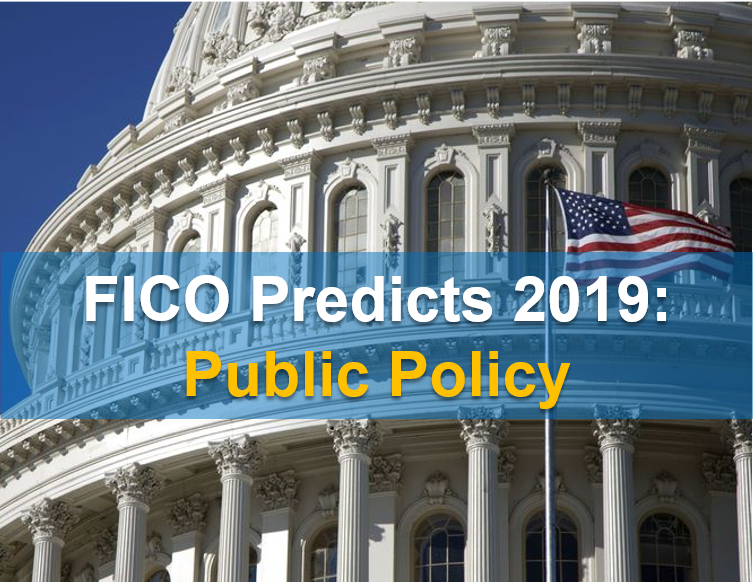Public Policy Predictions 2019: Regulatory Reforms Ahead
Blog: Enterprise Decision Management Blog

Since the November elections, much of the talk here in Washington, D.C. has been on preparing for a divided Congress. While many believe that the partisan divide will grow in 2019, this does not mean that all bank-related public policy proposals will be stuck in neutral.
In fact, when it comes to regulatory reforms promulgated by federal agencies, there could be some significant and welcome news for financial institutions. Below, are my predictions (they’re more like educated guesses) on some important issues of interest to the banking industry.
The FCC Will Issue a Major Declaratory Ruling on the Telephone Consumer Protection Act (TCPA)
This past year has been one of promise and progress for those waiting on TCPA reform. In March, the U.S. Court Appeals for the District of Columbia vacated key parts of the Federal Communications Commission (FCC) 2015 TCPA Order, which had created much confusion and sparked increased litigation. This month, the FCC approved the creation of a National Reassigned Number Database to address the nearly 100,000 wireless numbers that are reassigned each day. While the database is not expected to be operational for several years, the FCC did provide for a safe harbor that will protect those that leverage the database from TCPA liability.
The next step? I expect the FCC to issue a declaratory ruling in the first half of 2019 that will provide much needed clarity around the definition of Automatic Telephone Dialing System. This will lead to a favorable development for consumers who opt-in and businesses that utilize technology like FICO’s Customer Communication Services to communicate important information to their customers via their cellphones.
The BCFP Will Finally Release a Proposed Rule Governing Debt Collection
We have been talking about this for several years but I believe we are now just a few months away from the Bureau of Consumer Financial Protection issuing a Notice of Propose Rulemaking aimed at modifying the more than 40-year old Fair Debt Collections Practice Act. The proposed rule will focus on third-party collectors, addressing issues such as communication practices and consumer disclosures.
When will this happen? The latest fall 2018 rulemaking agenda indicates that the BCFP will issue the rule by March. I believe this will slip a few months but by June 2019 the proposed regulations will finally be available for public review and comment.
AML/BSA Reform Talks Will Intensify but Meaningful Changes Will Have to Wait
Bank Secrecy Act/anti-money laundering (BSA/AML) regulatory reforms are top of mind for regulators and legislators. This month, a group of federal agencies including the Federal Reserve, OCC, FDIC and the Financial Crimes Enforcement Network (FinCEN) issued a joint statement which encourages banks to consider, evaluate, and responsibly implement innovative solutions to BSA/AML compliance.
Members of Congress have also been focused on BSA/AML reforms. In June, House members Blaine Leutkeymeyer (R-MO) and Steve Pearce (R-NM) introduced legislation that included an increase in the thresholds for currency transaction reports (CTRs), from $10,000 to $30,000, as well as suspicious activity reports (SARS), from $5,000 to $10,000. These are two areas where financial institutions are spending billions of dollars a year on compliance and have been looking to ensure their extensive efforts are properly calibrated to provide regulators with meaningful insights. On this topic, a FICO colleague recently wrote a blog post noting that FinCEN received more than 2,000,000 SARs in 2017, and that by employing cognitive analytics FinCEN could gain new insights from these reports.
Where is BSA/AML reform headed in 2019? Legislative efforts will prove challenging. While there is some agreement to address the issue of beneficial ownership, other reforms have divided Republicans and Democrats. Despite extensive, ongoing discussions of BSA/AML reforms among regulators, a recent Senate Banking Committee hearing revealed stark differences between FinCEN and other agencies related to such issues as report SAR and CTR threshold increases. 2019 will produce a lot of constructive dialogue but significant changes are still at least a year away.
Regulators Will Make Major Strides Towards Reaching Consensus on Modernizing the Community Reinvestment Act
Adopted in 1977, the Community Reinvestment Act (CRA) was enacted to encourage banks to help meet the credit needs of the communities they serve, including low-to-moderate income neighborhoods. Over the past two decades, the banking industry has undergone numerous changes, most notably the expanded use of technology in financial services. As a result, the Trump Administration and the federal banking agencies have focused on regulatory reforms around the CRA.
In September, the OCC took the lead by issuing an Advance Notice Proposed Rulemaking asking the public 31 questions related to four main areas of the existing CRA regulatory framework. While the OCC is now reviewing the comments received from the ANPR, the larger challenge is finding consensus among the other banking regulators and reaching a mutual solution that both furthers the goals of the CRA and reflects the realities of the modern banking system. Look for the regulators to make great strides in the next 12 months, setting the stage for a proposed rule in 2020.
Cybersecurity Concerns Will Fuel Additional Data Privacy Laws in the States
In 2018, California became the first state to adopt GDPR-like privacy legislation. The steady stream of major data breach announcements will help fuel copycat bills introductions in other states. I predict at least one state will enact legislation similar to California.
However, legislation alone won’t mitigate data breaches. The FICO Cyber Risk Score is assisting banks as well as many other businesses enhance their cybersecurity through its unique measurement of forward-looking security risk. Any organization can get an ongoing, no-fee subscription and see their score. In addition, I encourage you to check out FICO and the US Chamber of Commerce’s quarterly cyber risk index report throughout 2019.
Coming off an election year, 2019 will likely bring an uptick in legislative and regulatory reforms activity. While Congress will attract the spotlight, the real action (and accomplishments) will take place at the federal agency level. On this last prediction, my confidence level is at its highest.
The post Public Policy Predictions 2019: Regulatory Reforms Ahead appeared first on FICO.
Leave a Comment
You must be logged in to post a comment.








